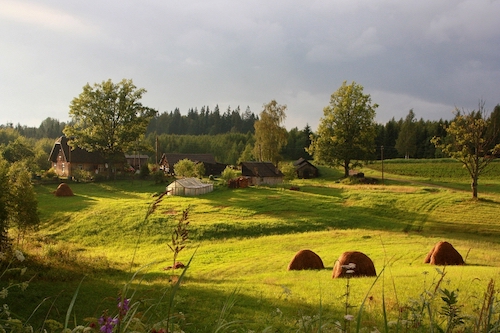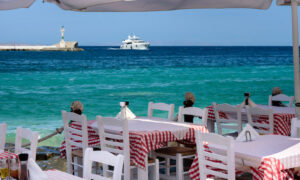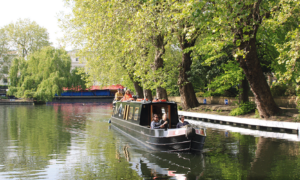The first question anyone asks us is, “Why are we, two Brits, in Latvia?” to which the answer is, “Why not?”
I mean, what’s not to like? The countryside is beautiful and quiet; where three cars in a row is a rush hour or a funeral. Where the summers are frequently hot and the winters cold, unlike the UK, where they can be damp and miserable, especially up North.

RURAL LATVIA
Even though some things can be expensive, the general cost of living in Latvia is low, meaning our savings have lasted a long time. Those are just some of the advantages of living in rural Latvia, far from the madding crowd.
The next question is usually, “How do we manage without the language?”
Unfortunately, living far from the madding crowd means we are also far from adequate language schools. My husband does not learn languages very well; he says it took him three attempts to get his English exam.
My excuse is that I embarked on a period of study that should culminate soon in a Ph.D. with an Estonian university and I do not have a great deal of space left in my head for learning Latvian as well, plus it is not an easy language either.
So how do we manage?
First, we lean on the wonders of mobile phones. That means trusted friends are never far away and fortunately ready to translate. Building trusted networks can never be underestimated. Next, is one of the best levels of internet provision in the world. We might live in our caravan in the middle of a field in the summertime, but we can still access the internet. It might not be super-fast, but it is there.
I have even been able to participate in online conferences. The fact that Latvia is relatively flat and lacks mountains probably helps. We live close to the highest peak in Latvia, which is a grand total of 312 meters.

ALPACAS … SOURCE OF THE WARMEST SWEATERS EVER. (Photo courtesy of Joanna Storie)
So, what do we do in our little rural idyll about 100 kilometers from the capital of Riga?
Lots of things really.
As I mentioned, I am doing research and my topic is participatory development in rural Latvia and Estonia. Basically, that means looking at how ordinary people can be better included in making decisions about the landscapes in which they live and work.
We have about 13 hectares of land with a sizable vegetable garden, some struggling apple trees and 3 hectares of forest to manage. We also have 18 very cute alpacas, about 26 chickens at the last count, and two cats – when one isn’t on holiday at the neighbour’s dairy farm, that is. We run felting courses using alpaca fleece; my husband shears our own alpacas and shears for others in Estonia and Latvia. His work may be expanding to other countries too.
Those are just some of the things we do. We also have construction work and maintenance of machinery to do. There’s endless snow clearing in winter, the greeting of visitors who generally just turn up, lots of researching when the alpacas get sick due to a lack of specialists in the country and so on.
An idyllic life, but not for the faint-hearted
We have become obsessive weather forecast watchers. We nervously scan the radar pictures to see if the rain is coming while we are trying to harvest hay or on shearing day as we run cables out to the alpaca houses for the equipment. The last thing we want is wet hay or wet alpacas.
We also worry when it is too dry. Will there be enough hay for the animals, or grass, or water? Will we have vegetables to eat over winter? Will the seeds even germinate? Life in the countryside is not for the faint-hearted. Like when the clouds are rolling in and we have to summon up the last ounce of strength to get those bales of hay in, because unlike the giant bales – these won’t stand outside.
It may be 10 o’clock at night after the last of the bales are undercover before we think about food, then sleep. We’re exhausted but safe in the knowledge that we have enough hay for the winter – although sometimes it’s close.
Country living is not one long holiday
Country living is not one long holiday and if you have any thoughts about an idyll in the country you had better realise really quickly that you might be working the hardest you have ever worked.
 So yes, we are living the dream and we wouldn’t swap it for anything, but making a living in a rural place is never easy and is fraught with many challenges.
So yes, we are living the dream and we wouldn’t swap it for anything, but making a living in a rural place is never easy and is fraught with many challenges.
If you are thinking of escaping to your own little cabin in the woods, make sure you know what you are letting yourself in for. Do your research, then go and help someone who is already doing it. Learn from them and be prepared to be flexible. Or, alternatively, stick to the day job and go and find someone to help in the summer – an extra pair of willing hands is often useful and better for you than a week in the gym.
(Author’s note: The rules for land ownership in Latvia have changed since we bought our land. Purchase of agricultural properties requires Latvian citizenship or EU membership, knowledge of Latvian to A1 standard and a business plan. You can see the document here.)
About the author:
Joanna Storie is a British emigrant and Ph.D. candidate living in Latvia.














